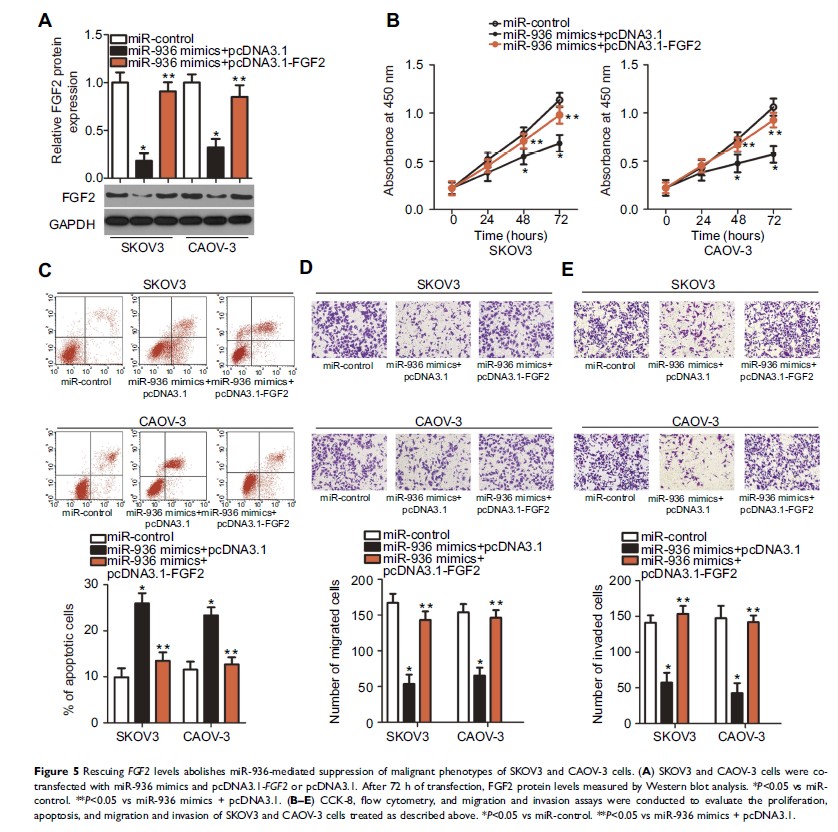9 0 9 6 8
论文已发表
注册即可获取德孚的最新动态
IF 收录期刊
- 2.6 Breast Cancer (Dove Med Press)
- 3.9 Clin Epidemiol
- 3.3 Cancer Manag Res
- 3.9 Infect Drug Resist
- 3.6 Clin Interv Aging
- 4.8 Drug Des Dev Ther
- 2.8 Int J Chronic Obstr
- 8.0 Int J Nanomed
- 2.3 Int J Women's Health
- 3.2 Neuropsych Dis Treat
- 4.0 OncoTargets Ther
- 2.2 Patient Prefer Adher
- 2.8 Ther Clin Risk Manag
- 2.7 J Pain Res
- 3.3 Diabet Metab Synd Ob
- 4.3 Psychol Res Behav Ma
- 3.4 Nat Sci Sleep
- 1.9 Pharmgenomics Pers Med
- 3.5 Risk Manag Healthc Policy
- 4.5 J Inflamm Res
- 2.3 Int J Gen Med
- 4.1 J Hepatocell Carcinoma
- 3.2 J Asthma Allergy
- 2.3 Clin Cosmet Investig Dermatol
- 3.3 J Multidiscip Healthc

MicroRNA-936 通过减活 PI3K/Akt 通路靶向 FGF2 以抑制上皮性卵巢癌侵袭性
Authors Li C, Yu S, Wu S, Ni Y, Pan Z
Received 23 April 2019
Accepted for publication 4 June 2019
Published 8 July 2019 Volume 2019:12 Pages 5311—5322
DOI https://doi.org/10.2147/OTT.S213231
Checked for plagiarism Yes
Review by Single-blind
Peer reviewers approved by Ms Rachel Predeepa
Peer reviewer comments 3
Editor who approved publication: Dr Federico Perche
Purpose: MicroRNA-936 (miR-936) was previously reported to be dysregulated and involved in the development of non-small cell lung cancer and glioma. However, the functional roles of miR-936 in epithelial ovarian cancer (EOC) remain unclear. In this study, we aimed to evaluate miR-936 expression in EOC and investigate its regulatory role in EOC cell behavior.
Methods: The expression of miR-936 in EOC was measured by RT-qPCR. Cell proliferation, apoptosis, migration, and invasion in vitro, as well as tumor growth in vivo, were determined by CCK-8, flow cytometry, migration and invasion assays, and xenograft models in nude mice, respectively. Bioinformatics analysis, luciferase reporter assays, RT-qPCR, and Western blot analysis were performed to investigate the relationship between miR-936 and fibroblast growth factor 2 (FGF2).
Results: miR-936 expression was significantly downregulated in EOC tissues and cell lines. Low miR-936 expression was found to be correlated with the tumor size, FIGO stage, and lymphatic metastasis in EOC patients. Functional experiments indicated that ectopic miR-936 expression suppressed EOC cell proliferation, migration, and invasion; promoted cell apoptosis; and decreased tumor growth in vivo. In addition, the FGF2 gene was verified to be a direct target of miR-936 in EOC cells. FGF2 expression levels were upregulated in EOC tissues and were inversely correlated with miR-936 expression. Furthermore, effects of FGF2 silencing were similar to those of miR-936 overexpression in EOC cells. Recovered FGF2 expression rescued the miR-936-induced inhibitory effects in EOC cells. Notably, miR-936 was able to deactivate the PI3K/Akt signaling pathway in EOC cells by regulating FGF2 both in vitro and in vivo.
Conclusion: Altogether, our findings provided initial evidence that miR-936 inhibits the aggressiveness of EOC cells in vitro and in vivo, at least partially, by targeting FGF2-mediated suppression of the PI3K/Akt pathway. Therefore, the miR-936/FGF2/PI3K/Akt pathway is a promising therapeutic target for the treatment of EOC patients.
Keywords: epithelial ovarian cancer, microRNA-936, fibroblast growth factor 2, PI3K/Akt pathway
